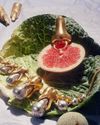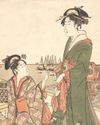
TALISMANS, AMULETS AND LUCKY CHARMS. These, more often than not, come in the form of a sculpture or a piece of jewellery. They were created and used throughout ancient times as potent symbols of protection, bestowing luck upon the wearer and thus serving a purpose beyond the decorative. Fast forward to the present day, and figurines and purpose-specific jewellery still hold importance.
Over time, the talismanic charms of jewellery have survived the ebb and flow of trends. Some of the more notable brands that have dipped into this pool include luxury French jeweller Chaumet who paid celestial tribute in its latest Les Ciels de Chaumet collection, and Miuccia Prada’s Talisman collection from two years ago, that featured animals such as bears, lion and birds. The Talisman collection emphasised the way in which primitive forms have shaped human consciousness. While it is rare to come across brands with a longstanding association with the spiritual world, some have made it their signature. Van Cleef & Arpel’s iconic symbol of luck, the Alhambra, was created in 1968.
The symbolism behind this jewellery seems to be making a comeback yet again, with medallion necklaces getting a boost in popularity thanks to their prominence among Net-a-Porter’s product offerings and symbolic gemstones filling the pages of Instagram. While many jewellery labels have leveraged on the trend, one, in particular, stands out as a jeweller that creates its pieces around the belief of spiritual magic. Founded in 2015, Foundrae is a fine jewellery brand that (in its own words) “celebrates a set of values that is greater than gold itself”. Beth Bugdaycay, co-founder of Foundrae, spoke to T Singapore about the language of mystical symbols and why they appeal to the modern customer.
LYNETTE KEE: Tell me the story behind Foundrae — what is the concept and how did it start?
この記事は T Singapore: The New York Times Style Magazine の November 2019 版に掲載されています。
7 日間の Magzter GOLD 無料トライアルを開始して、何千もの厳選されたプレミアム ストーリー、9,000 以上の雑誌や新聞にアクセスしてください。
すでに購読者です ? サインイン
この記事は T Singapore: The New York Times Style Magazine の November 2019 版に掲載されています。
7 日間の Magzter GOLD 無料トライアルを開始して、何千もの厳選されたプレミアム ストーリー、9,000 以上の雑誌や新聞にアクセスしてください。
すでに購読者です? サインイン

Look At Us
As public memorials face a public reckoning, there’s still too little thought paid to how women are represented — as bodies and as selves.

Two New Jewellery Collections Find Their Inspiration In The Human Anatomy
Two new jewellery collections find their inspiration in the human anatomy.

She For She
We speak to three women in Singapore who are trying to improve the lives of women — and all other gender identities — through their work.
Over The Rainbow
How the bright colours and lively prints created by illustrator Donald Robertson brought the latest Weekend Max Mara Flutterflies capsule collection to life.

What Is Love?
The artist Hank Willis Thomas discusses his partnership with the Japanese fashion label Sacai and the idea of fashion in the context of the art world.

The Luxury Hotel For New Mums
Singapore’s first luxury confinement facility, Kai Suites, aims to provide much more than plush beds and 24-hour infant care: It wants to help mothers with their mental and emotional wellbeing as well.

Who Gets To Eat?
As recent food movements have focused on buying local or organic, a deeper and different conversation is happening among America’s food activists: one that demands not just better meals for everyone but a dismantling of the structures that have failed to nourish us all along.

Reimagining The Future Of Fashion
What do women want from their clothes and accessories, and does luxury still have a place in this post-pandemic era? The iconic designer Alber Elbaz thinks he has the answers with his new label, AZ Factory.

A Holiday At Home
Once seen as the less exciting alternative to an exotic destination holiday, the staycation takes on new importance.
All Dressed Up, Nowhere To Go
Chinese supermodel He Sui talks about the unseen pressures of being an international star, being a trailblazer for East Asian models in the fashion world, and why, at the end of the day, she is content with being known as just a regular girl from Wenzhou.